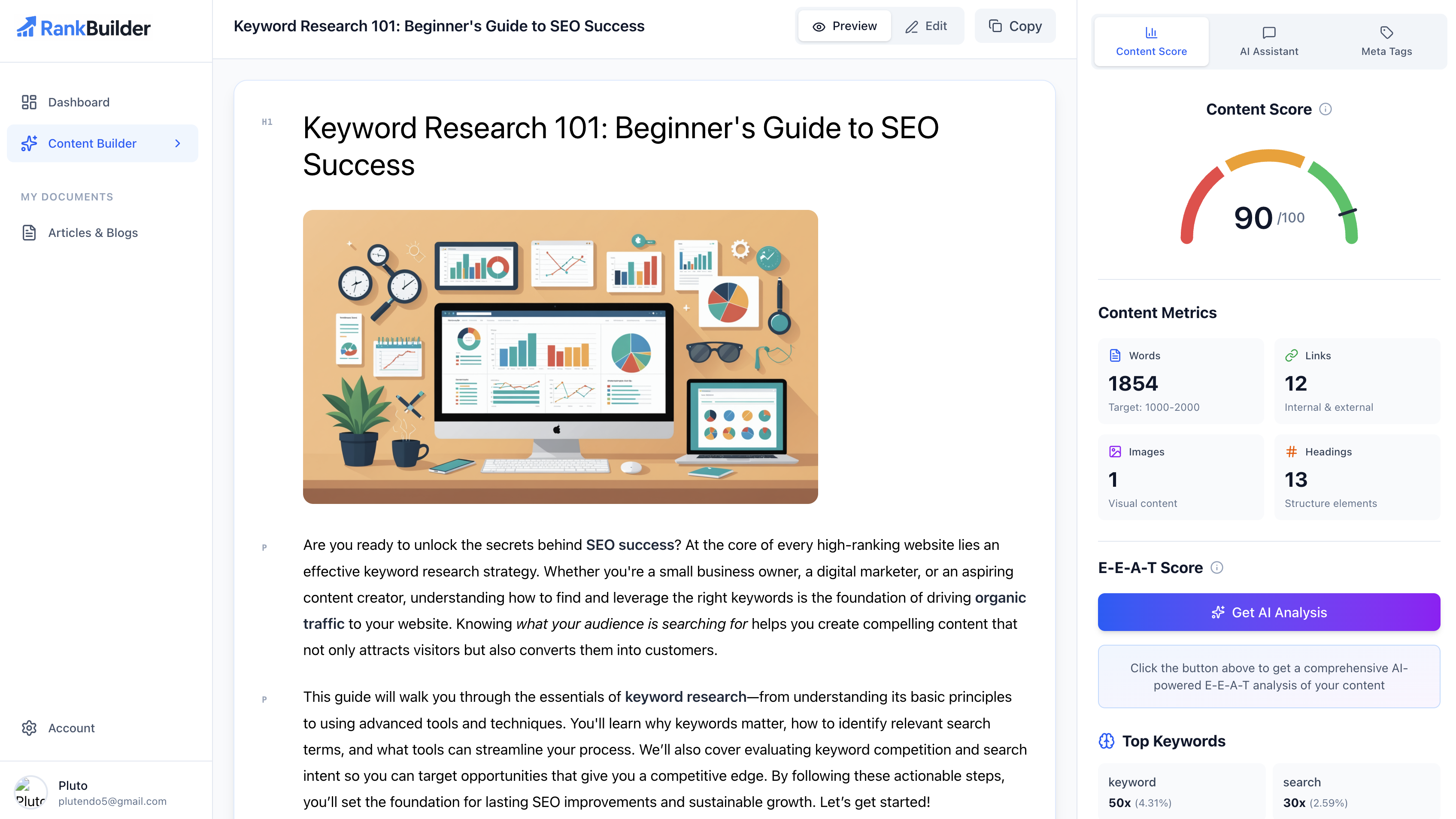Keyword Research 101: Beginner's Guide to SEO Success

Are you ready to unlock the secrets behind SEO success? At the core of every high-ranking website lies an effective keyword research strategy. Whether you're a small business owner, a digital marketer, or an aspiring content creator, understanding how to find and leverage the right keywords is the foundation of driving organic traffic to your website. Knowing what your audience is searching for helps you create compelling content that not only attracts visitors but also converts them into customers.
Table of Contents
Why Keyword Research Matters in SEO
Keyword research forms the backbone of any effective SEO strategy. Without targeting specific, relevant search terms, your content is unlikely to be discovered by your audience. At its core, keyword research connects what people are searching for with the content you provide. When you use the words your audience types into search engines, you help bridge the gap between their needs and your solutions, making your website more relevant and accessible.
The search landscape is constantly evolving. According to recent research by Search Engine Land, over 90% of online experiences begin with a search engine. Focusing on keyword intent—that is, understanding why a user is performing a particular query—enables you to craft content that directly answers their questions. This can dramatically improve engagement and increase conversion rates, turning casual visitors into loyal followers or paying customers.
Strategic keyword research also helps you stay competitive. By identifying which keywords your competitors rank for, you can discover gaps and opportunities to position your content more effectively. Targeting a mix of high-volume and less competitive, long-tail keywords results in a balanced approach that garners steady traffic while minimizing risk. Ultimately, ongoing keyword research keeps your SEO efforts aligned with evolving market trends and user behavior, ensuring that your site remains relevant and authoritative in your niche.
The ROI of Effective Keyword Research
Investing time in keyword research pays off in multiple ways. Not only do you improve your site’s visibility on search engines like Google and Bing, but you also drive more qualified leads. According to Ahrefs, the right keyword strategy can lead to exponential growth in organic search traffic. Businesses that prioritize keyword research report higher returns on content marketing investment and greater search engine ranking stability.
In summary, mastering keyword research is your first step toward achieving long-term SEO success. It’s a discipline that rewards consistency, expertise, and a clear understanding of your audience’s intent.
Identifying Keyword Opportunities
Effectively finding keyword opportunities is essential for building a winning SEO strategy. It starts with brainstorming a seed list of topics relevant to your industry, products, or services. These seed keywords form the foundation upon which you can expand your reach. For instance, if you run a coffee shop, keywords like “best coffee beans,” “local café,” or “how to brew espresso” might be a strong starting point.
From this list, you’ll want to evaluate search volume, relevance, and ranking difficulty. Tools like SEOCheckr Free Tools assist in analyzing these metrics. High search volume indicates demand, but it often means more competition. Relevance ensures that the keywords align with what your site offers, and ranking difficulty lets you assess your chances of appearing on the first page of search results.
In addition, tapping into long-tail keywords—phrases that are longer and more specific—offers key advantages. Although these have lower search volumes, they typically result in higher conversion rates because they reflect more precise user intent. For example, “best organic coffee beans for French press” targets a specific audience and is easier to rank for compared to generic keywords. Long-tail keywords are ideal for new or niche websites looking to build their authority.
Keyword Variations and Synonyms
To maximize reach, explore keyword variations, synonyms, and related expressions. Users search with a variety of phrases, so capturing these increases your content’s visibility. Consider tools like Google’s “People Also Ask” and auto-suggest features to uncover additional opportunities. For organizations or nonprofits, using semantic keywords—as explained in this Moz SEO resource—can help ensure you’re addressing all aspects of a topic, which in turn can boost rankings and strengthen your expertise.
By systematically identifying keyword opportunities, you establish the core topics and subtopics for your website, making it easier to plan and organize impactful content that fulfills your audience’s needs.
Using Keyword Research Tools Effectively
Efficient keyword research relies on robust tools that provide in-depth data on search trends, volumes, and competition. While manual research can be insightful, dedicated keyword research tools automate and streamline the process. Common tools such as Google Keyword Planner, Ahrefs, SEMrush, and SEOCheckr Free Tools supply critical data about keyword performance, related phrases, and seasonal trends.
These tools help you analyze not just the popularity of a keyword, but also its competitiveness. For beginners, it’s important to balance high-volume prospects with those easier to rank for. Many tools display a “difficulty score,” guiding you toward realistic choices that match your website’s current domain authority. This ensures you don’t waste resources chasing terms dominated by established competitors.
Free and paid tools are available, each offering a range of features. Below is a quick comparison of some popular options for keyword research:
| Tool | Free Version | Notable Features |
|---|---|---|
| SEOCheckr | Yes | SEO checker, keyword generator, meta tag analysis |
| Google Keyword Planner | Yes | Search volume, forecast, basic competition data |
| Ahrefs | Limited | Comprehensive keyword research, SERP analysis |
| SEMrush | Limited | Keyword difficulty, competitor analysis, trends |
Each tool brings unique value. For example, SEOCheckr is ideal for those seeking cost-effective solutions, while Ahrefs and SEMrush provide deeper competitor analysis and advanced data—but usually at a premium. Most beginners find great value in starting with free or freemium tools as they learn the ropes.
How to Use Keyword Tools Effectively
Begin by inputting your seed keywords and examining the results. Look for long-tail phrases, related terms, and questions users commonly ask. Use filters to prioritize by search intent, geographical location, or language as needed. Track keyword trends over time to adapt your strategy seasonally or in response to breaking industry news. Mastering these tools helps you efficiently uncover actionable insights and position your content for improved search visibility.
Analyzing Competition and Search Intent
After assembling your keyword list, evaluating the competitive landscape is vital. You must assess which sites currently rank for your target keywords and how strong their positioning is. Use your chosen research tools to analyze the domain authority of top-ranking pages, the quantity and quality of backlinks, and the nature of their content. For high-volume keywords, expect established brands and older domains to dominate the first page—and plan your strategy accordingly.
Understanding search intent is equally crucial. Each keyword phrase reflects a different user intention: informational (“how to fix a leaky faucet”), navigational (“login to Gmail”), transactional (“buy running shoes online”), or commercial investigation (“best smartphones 2024”). Aligning your content format with the underlying intent boosts your chances of ranking. For example, blog articles are well-suited to informational keywords, while product landing pages excel with transactional keywords. For more background, see Google’s explanation of structured data and its impact on search appearance.
| Intent Type | Example Keyword | Recommended Content |
|---|---|---|
| Informational | How to make sourdough bread | Step-by-step guide, video, blog post |
| Transactional | Buy wireless headphones | Product page, comparison, reviews |
| Commercial | Best SEO tools 2024 | Listicle, product comparison, expert analysis |
Seasoned SEOs recommend a mix of keyword targeting strategies. Focusing on low-competition, high-intent terms often yields quicker results for new or small websites. Over time, as your domain authority grows, tackle more competitive keywords. Regularly revisiting and updating your keyword list ensures that your SEO strategy remains dynamic and responsive to market changes.
Competitive Content Gap Analysis
Finally, perform a content gap analysis. Identify topics your competitors rank for but you do not. By creating focused, high-quality content around these gaps, you can capture untapped traffic and fill needs left unmet within your niche. This analytical approach strengthens your content plan and boosts your odds of achieving top search engine rankings.
Integrating Keywords into Your Content Strategy
Identifying the right keywords is only half the battle—integrating them effectively into your content strategy amplifies their impact. Start by mapping primary and secondary keywords to specific pages or blog posts. Each piece of content should be optimized for one main keyword and a handful of closely related secondary keywords, ensuring your website maintains a clear and organized focus. This prevents keyword cannibalization, where multiple pages compete for the same search term and dilute your rankings.
Next, naturally incorporate your target keywords into critical on-page elements. This includes the title tag, meta description, URL slug, headings, and naturally within the body copy. Overusing keywords (“keyword stuffing”) can harm your rankings and reader experience, so always write for humans first and search engines second.
In addition to direct keyword placement, use latent semantic indexing (LSI) keywords—terms related to your main keyword—to broaden your content’s relevance. For example, when optimizing for “best running shoes,” you might include terms like “cushioning,” “breathable material,” and “trail running.” This helps search engines understand context and improves your chances of ranking for a wider array of searches.
Building a Content Calendar Around Keywords
Develop a content calendar that aligns with your keyword research. Prioritize publishing high-potential topics and ensure consistent updates. Track performance metrics such as traffic, bounce rate, and rankings for each target keyword using analytics platforms like Google Analytics or SEOCheckr’s reporting features. By monitoring results, you can identify what’s working and refine your strategy over time.
Finally, continually revisit and update older content with new keywords, statistics, or insights. SEO is an ongoing process, and maintaining content freshness signals to search engines that your site is active and trustworthy. Effective integration of keywords into your content strategy is the key to sustaining SEO growth and reaping long-term benefits.
Conclusion
In conclusion, keyword research stands as the cornerstone of every successful SEO campaign. By understanding why keywords matter, identifying opportunities aligned with your audience, leveraging powerful research tools, analyzing the competition, and skillfully integrating keywords into your content strategy, you lay the groundwork for improved visibility and sustainable online growth. Remember: SEO is a journey, not a sprint—consistent practice and refinement yield the best results.
Take the next step in your SEO journey today. Empower your website’s performance by utilizing expert tools such as SEOCheckr Free Tools to streamline your keyword research and boost your site’s search rankings. Whether you’re a beginner or looking to refresh your strategy, focused keyword research will help you stand out in crowded search engine results and achieve your digital goals.

